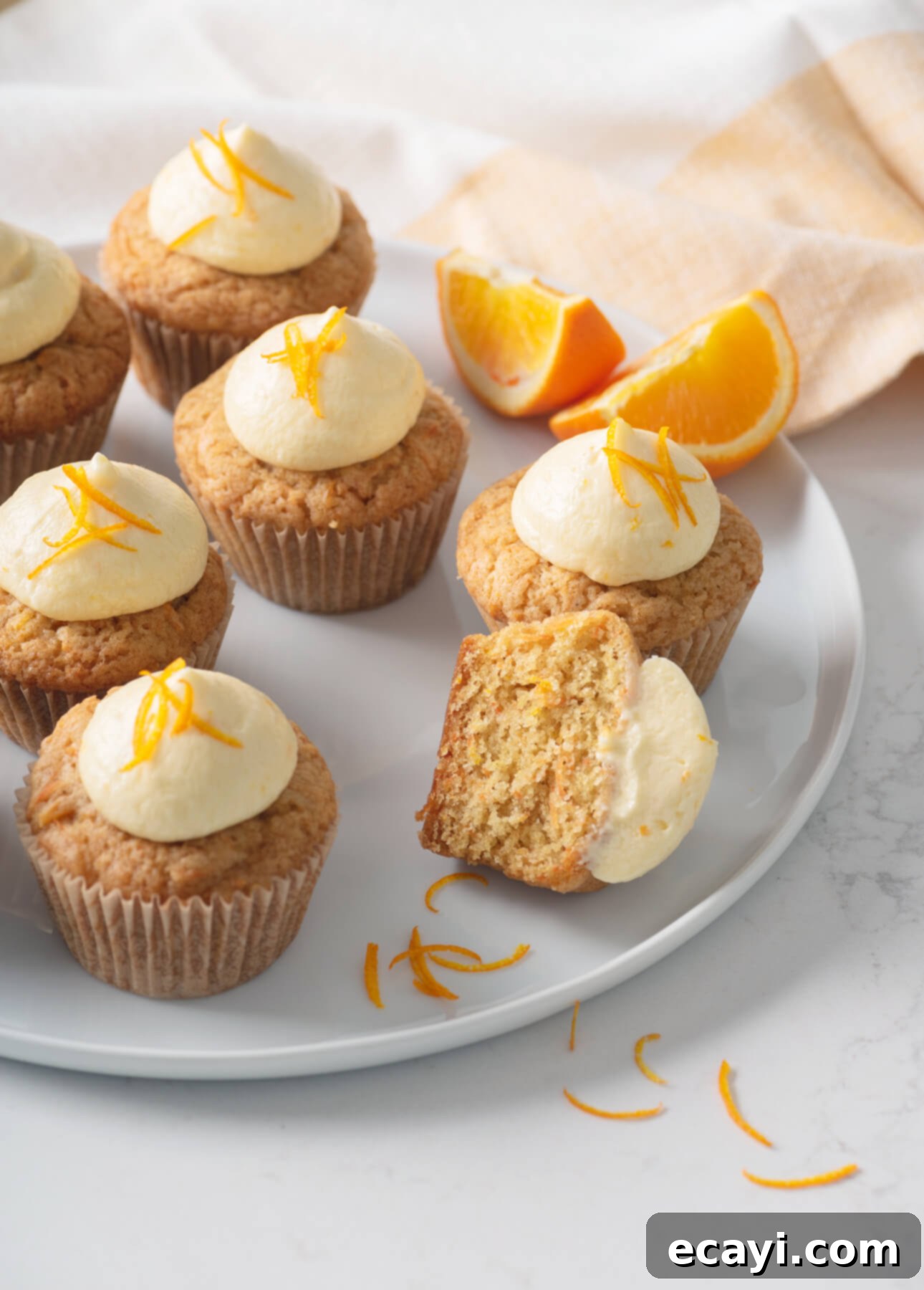Deliciously Fluffy Vegan Carrot Cupcakes: A Secretly Plant-Based Indulgence
These Vegan Carrot Cupcakes redefine what’s possible in plant-based baking, offering a delightfully fine and super-tender crumb, a gently spiced flavor profile, and a crowning glory of super-fluffy, orange-infused frosting. Prepare to amaze your guests – they truly won’t believe these indulgent treats are entirely vegan!
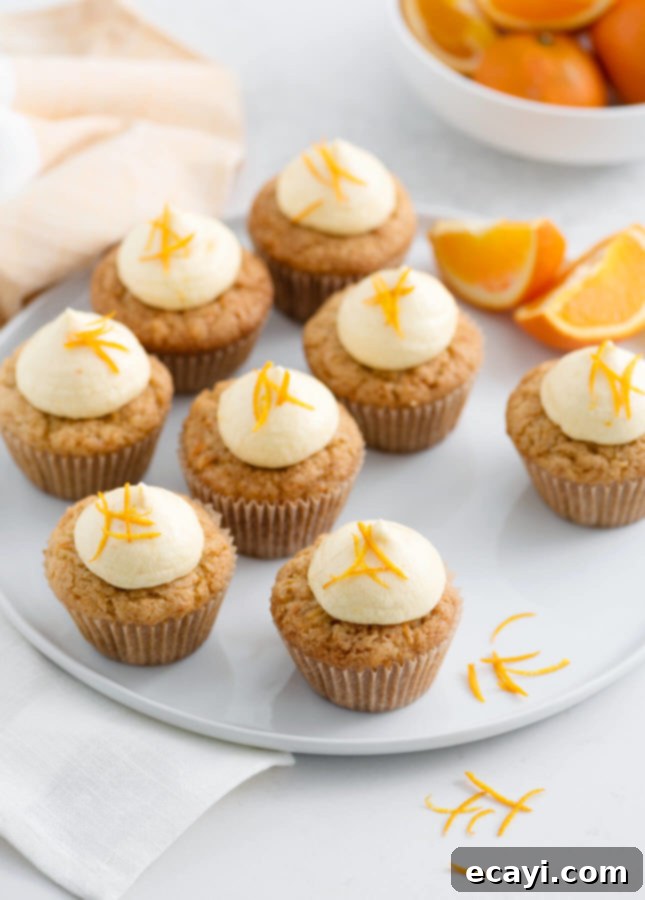
This post contains affiliate links. Full disclosure is at the bottom of the article.
The journey to perfecting these vegan carrot cupcakes began out of a heartfelt desire to create something truly special and inclusive. Last spring, my niece, who had recently embraced a vegan diet, was visiting, and I wanted to bake a dessert that would not only delight her but also be enthusiastically enjoyed by everyone at the table. My goal was clear: no “failed vegan experiments” for the general crowd, and certainly no disheartening “fruit salad” option for my niece while others savored rich cake. I’ve experienced firsthand the disappointment of being offered a limited alternative, and I was determined to find or create the perfect plant-based treat – one that was so delicious, its vegan nature would be a delightful secret.
While I don’t follow a vegan diet myself, my personal experience with lactose intolerance has led me on a multi-year exploration into the world of vegan dessert recipes. Through countless experiments, I’ve come to firmly believe that many classic desserts can be successfully transformed into their vegan counterparts without compromising on taste, texture, or overall flavor. Carrot cake has always been one of my absolute favorites, so when I stumbled upon a recipe for vegan carrot cupcakes, I knew it presented the perfect challenge and opportunity. I set out to tweak, test, and refine it until it reached what I considered perfection. On the day I proudly served these delectable vegan carrot cupcakes, only my niece was privy to the “vegan secret.” I observed as everyone else savored their dessert, and then, with anticipation, I asked them to guess what was unique about the cupcakes. As you might predict, no one could tell the difference; they simply enjoyed a wonderfully moist and flavorful carrot cupcake.
One of the most significant hurdles in vegan baking is finding effective substitutes for eggs. Replacing milk and butter is relatively straightforward, thanks to the abundance of excellent plant-based alternatives available today. However, eggs present a far more complex challenge. Eggs are more than just an ingredient; they are quintessential to the very structure, stability, texture, and moisture of most baked goods. Their multifaceted role includes binding ingredients together, emulsifying fats and liquids, providing crucial leavening for a light and airy crumb, and contributing to the overall richness and moisture. Over the years, I’ve experimented with a wide array of egg substitutes, from flax and chia “eggs” to applesauce, mashed silken tofu, and even mashed banana. While these can certainly work in specific recipes – particularly those that are already dense or don’t rely heavily on rise – none of them inherently possess significant leavening power. Simply swapping one of these for an egg in a cake recipe often results in a dense, heavy, or rubbery texture. Increasing baking powder and baking soda can help, but too much can lead to an undesirable flavor alteration or an overly crumbly texture. Achieving that beautifully fluffy and moist cake without eggs requires a more sophisticated solution.
So, the pressing question for any aspiring vegan baker becomes: what is the best egg substitute to create beautifully fluffy and moist vegan cakes, especially for recipes where eggs play such a crucial role?
Today, I’m thrilled to share the secret ingredient that makes these vegan carrot cupcakes taste and feel incredibly close to their classic, egg-filled counterparts: commercial egg replacer.
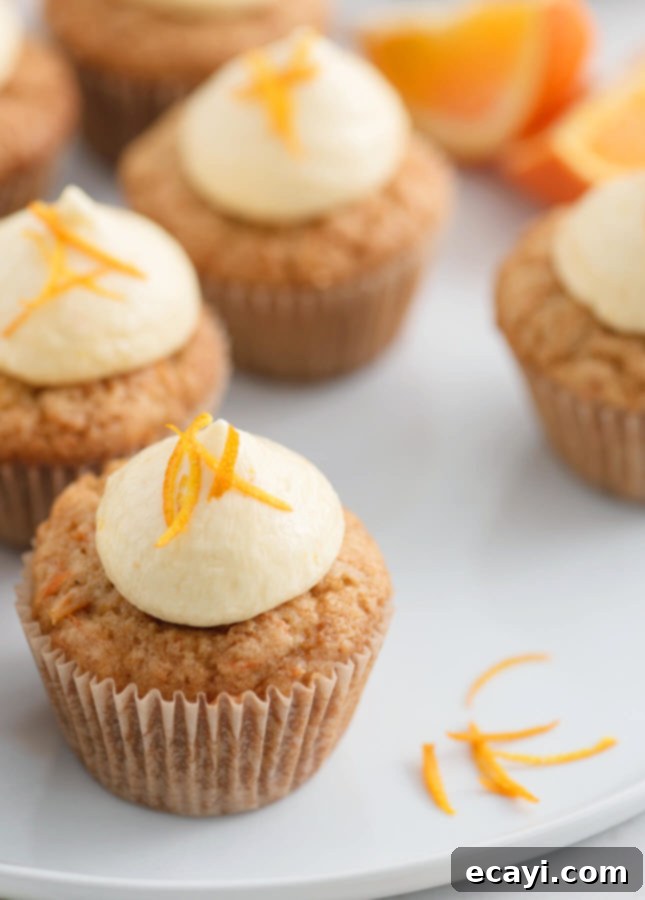
What Is Egg Replacer and Why Is It a Game-Changer for Vegan Baking?
Egg replacer is a specially formulated commercial powder product designed to act as a direct substitute for eggs in baked goods. Unlike whole food alternatives, egg replacers are engineered to mimic the complex functions of eggs: they bind ingredients, emulsify fats for a smoother batter, provide moisture, and, crucially, contribute to the leavening process, ensuring a desirable rise. Many reputable brands offer egg replacers, including Ener-G, Bob’s Red Mill, and Orgran, among others. The exact composition varies by brand, but generally, egg replacers consist of a blend of starches (such as potato or tapioca starch) for binding, various gums (like cellulose gum or xanthan gum) for emulsification and structure, and leavening agents (like baking powder and baking soda) to assist with the rise. This powdered mixture typically needs to be combined with a liquid, usually water, before being incorporated into your recipe, transforming it into a functional egg substitute.
The advantages of using egg replacers extend far beyond simply enabling vegan baking. They are an invaluable ingredient for a wide range of dietary needs:
- Vegan-Friendly: Naturally, they are ideal for anyone following a plant-based diet.
- Allergy-Friendly: They provide a safe alternative for individuals with egg allergies, preventing allergic reactions without sacrificing culinary enjoyment.
- Lactose Intolerance: Many egg replacers are also dairy-free, making them suitable for those with lactose intolerance (always check specific product labels).
- Cholesterol-Free: As they contain no animal products, egg replacers are completely cholesterol-free, making them a healthier choice for those on reduced-cholesterol diets.
- Kosher and Gluten-Free Options: Most brands offer kosher-certified products, and many provide gluten-free varieties. For example, Bob’s Red Mill has both a soy and wheat-based egg replacer and a dedicated gluten-free version, catering to various sensitivities.
Finding egg replacer products is becoming increasingly easy. They are readily available online through major retailers, in most natural foods stores, and often in the dedicated natural or health foods sections of larger grocery stores. Keep an eye out for them – they are a true pantry staple for plant-based bakers.
Through extensive testing in various cakes, cupcakes, and muffins, I’ve discovered the optimal applications for commercial egg replacers. My findings indicate that egg replacer performs exceptionally well in recipes that originally call for 1 to 3 eggs. In these scenarios, egg replacer truly works wonders. The results are consistently impressive; you would never suspect that no actual eggs were used in the baked goods, including these irresistibly addictive vegan carrot cupcakes. The resulting texture is incredibly light, moist, and tender – every bit as delightful and satisfying as a classic carrot cupcake should be, proving that vegan baking can achieve the same lofty standards as traditional methods.
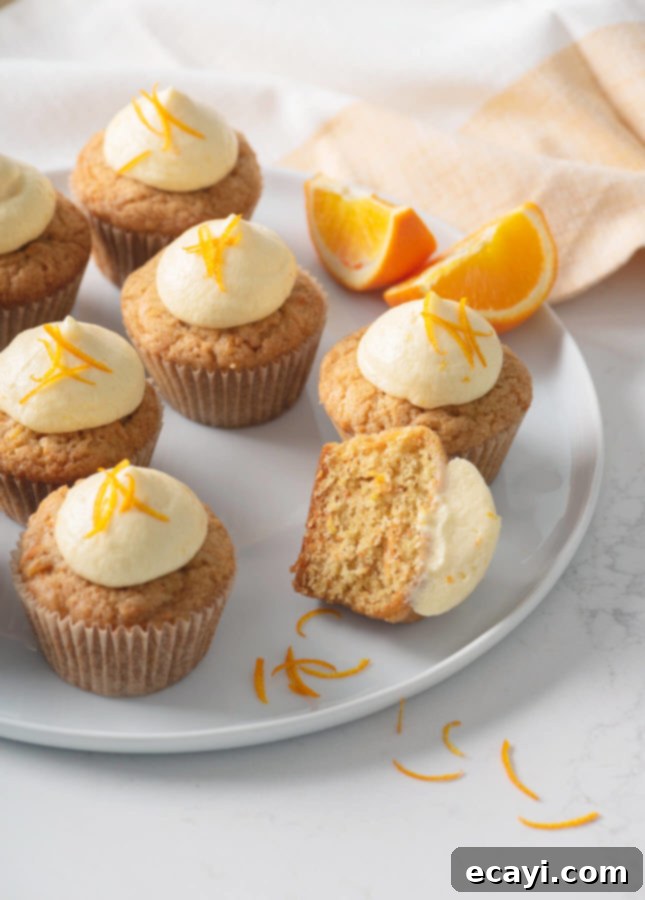
Helpful Tips for Crafting Perfect Vegan Carrot Cupcakes
Achieving truly outstanding vegan carrot cupcakes involves a few clever techniques and ingredient choices. Here are my top tips to ensure your cupcakes are a resounding success:
- Infuse Flavor with Your Egg Replacer Liquid: Egg replacer is typically a powder that needs to be reconstituted with a liquid before being added to your recipe. Instead of simply using water, seize this opportunity to enhance the overall flavor of your cupcakes! In this particular vegan carrot cupcake recipe, I’ve opted for orange juice, complementing it with finely grated orange zest. The citrus notes beautifully brighten and uplift the warm, earthy spices and sweet carrots, adding an extra layer of delicious complexity to every bite.
- Grate Carrots Exceptionally Fine for Optimal Texture: The texture of your grated carrots plays a significant role in the final consistency of your vegan carrot cupcakes. Grating the carrots extra-fine ensures that they fully meld into the cupcake batter as they bake, becoming an integral part of the tender crumb rather than standing out as distinct pieces. This technique prevents any undesirable “carrot strings” and contributes to a uniformly moist and smooth cupcake. For the best results, I highly recommend using either a coarse Microplane grater for super-fine strands or the smaller holes of a box grater. The finer the grate, the better the integration and moisture distribution.
- Choosing Your Vegan Frosting Base: Vegan Butter or Vegan Cream Cheese? The frosting is often the crowning glory of a cupcake, and for these vegan carrot cupcakes, the choice of plant-based butter or cream cheese is key. It’s important to remember that each brand of vegan butter and vegan cream cheese has its own unique flavor profile and consistency. None will perfectly replicate traditional dairy products, but many offer excellent alternatives. I strongly encourage you to experiment and discover which brand’s flavor you prefer. Using your favorite will undoubtedly result in a frosting that you’ll adore and proudly serve.
- My Tried-and-True Vegan Butter and Cream Cheese Recommendations: If you’re new to the world of vegan butters and cream cheeses, or simply seeking reliable recommendations, allow me to share my favorites and insights:
- For a superb vegan butter base, my personal go-to is Earth Balance’s Original Buttery Sticks. I find this product offers a lovely, mild flavor that doesn’t overpower the cupcake, and crucially, it provides excellent structure for frostings. The stick format contains less water than the tub spread, resulting in a firmer consistency that is ideal for pipeable frostings. If the sticks are unavailable, the widely accessible Original Buttery Spread can be used; your frosting might be slightly softer, but it will still pipe beautifully.
- An exciting new contender generating buzz is Fora’s Faba Butter, ingeniously crafted from chickpea water (aquafaba). Many bakers are raving about its remarkably butter-like taste and performance. According to Fora’s website, Faba Butter is currently sold exclusively at Eataly in the US. If you’ve had the chance to try it, please share your feedback in the comments – I’m eager to hear your thoughts! I’m certainly looking forward to getting my hands on it and sharing my own review soon.
- When it comes to vegan cream cheese, most products are formulated for easy spreading, which can make them too soft for a stable, pipeable frosting. If you’re craving that classic cream cheese frosting flavor (and who wouldn’t!), my best advice is to combine half of Daiya’s Plain Cream Cheese Style Spread (for its distinct flavor) with half vegan butter (for the necessary structure and texture). It is absolutely essential to refrigerate this combined frosting thoroughly before attempting to pipe. While it will still be a bit softer than traditional cream cheese frosting, and might spread slightly, it will hold its shape well enough to create beautiful swirls without dripping down the sides of your cupcakes.
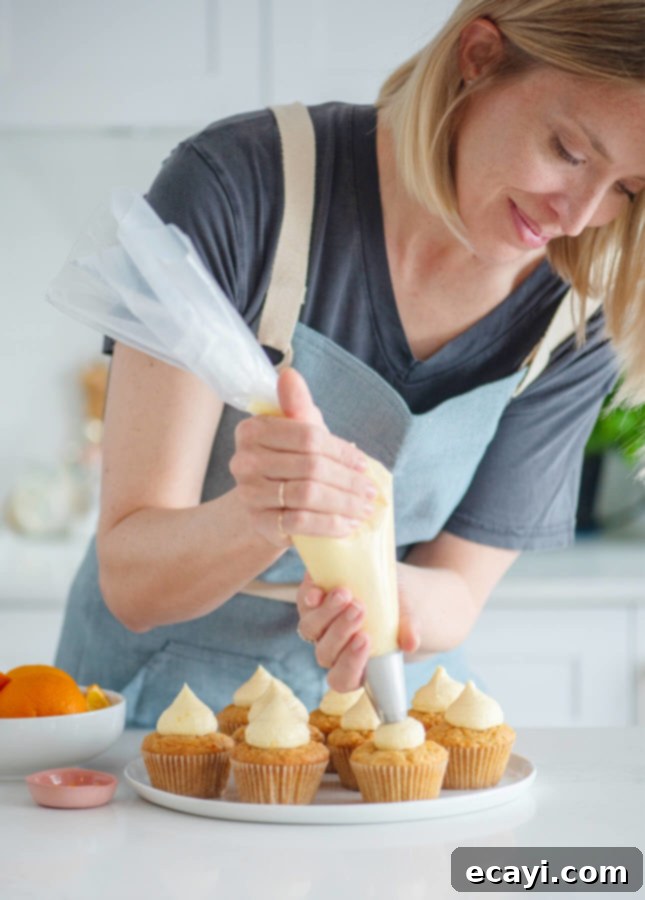
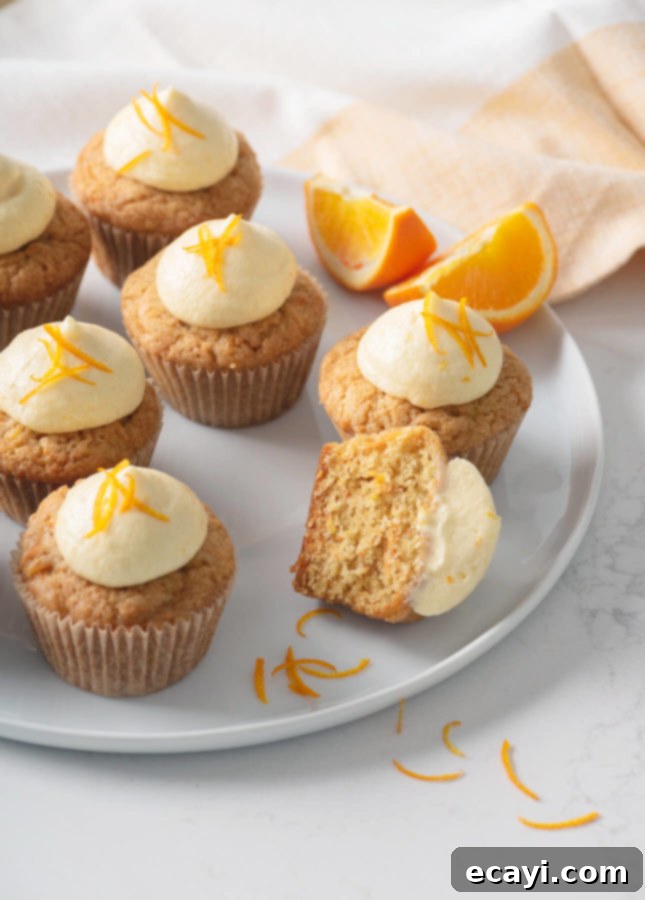
Pin Recipe
Vegan Carrot Cupcakes
Ingredients
For the cupcakes
- 1 1/2 cups 125 g all-purpose flour
- 1 tsp 5 ml baking powder
- 1/2 tsp 2 ml baking soda
- 1/2 tsp 2 ml ground cardamom or cinnamon
- 1/2 tsp 2 ml ground ginger
- 1/2 tsp 2 ml kosher salt, or fine sea salt
- 1/4 cup 60 ml orange juice
- 1/4 cup 60 ml plant milk (oat, soy, almond, or cashew beverage)
- 1 tbsp 15 ml egg replacer (see note)
- 1 tsp 5 ml pure vanilla extract
- 1 cup 200 g granulated sugar
- 3/4 cup 180 ml extra-virgin olive oil, or canola oil
- 1 tbsp 15 ml finely grated orange zest (about 1/2 orange)
- 1 1/4 cups 125 g finely grated carrots (4.4 oz)
For the vegan frosting
- 1 cup 227 g room temperature vegetable shortening (i.e. vegan butter, such as Earth Balance’s Original Buttery Sticks, or Earth Balance’s Original Buttery Spread, or Fora’s Faba Butter), or substitute half of the vegan butter for 1/2 cup (112 g) vegan cream cheese (such as Daiya’s Plain Cream Cheese Style Spread)
- 2 1/2 cups 300 g powdered sugar
- 1 tbsp 15 ml finely grated orange zest (about 1/2 orange)
- Pinch of kosher salt or fine sea salt
Instructions
-
For the cupcakes: Preheat the oven to 350°F (175°C). Line a muffin pan with parchment paper liners.
-
In a large mixing bowl, whisk together the flour, baking powder, baking soda, cardamom, ginger, and salt. Set aside.
-
In a second mixing bowl, whisk together the orange juice, plant milk, egg replacer, and vanilla extract. Whisk in the sugar, olive oil, and orange zest. Add the grated carrots and stir to incorporate, making sure the carrot distributes evenly throughout the mixture.
-
Pour the wet ingredients over the dry ingredients and fold, using a spatula, right up until no streaks of flour remain. Divide the batter between the prepared muffin cups, filling each cup about 3/4 full.
-
Bake for about 22 minutes, rotating the pan halfway through, or until a toothpick inserted in the center of a cupcake comes out clean. Transfer the pan to a cooling rack and let the cupcakes cool completely before frosting.
-
For the vegan frosting: In the bowl of a stand mixer fitted with the paddle attachment, or in a large mixing bowl if using a hand mixer, beat the vegan butter or vegan cream cheese until creamy and smooth, about 3 minutes, scraping the bowl with a spatula as needed.
-
Sift in a third of the powdered sugar, then mix at low speed to incorporate. Repeat twice to incorporate all the sugar. Add the orange zest and salt. Beat on medium speed, until the vegan frosting is light and fluffy, about 5 minutes.
-
Pipe or spread the frosting over the cooled vegan carrot cupcakes.
-
SERVING: Always serve the vegan carrot cupcakes at room temperature. If the cupcakes are refrigerated, bring them back to room temperature 25 minutes before serving.
-
STORAGE: Store the frosted vegan carrot cupcakes in an airtight container in the refrigerator for up to 3 days. You can also freeze the frosted cupcakes in an airtight container for up to 1 month. Bring frozen cupcakes back to room temperature40 minutes before serving.
NOTE: Not vegan? Here’s how to make these cupcakes using eggs and dairy products:
-
In the cupcakes, replace the egg replacer and orange juice with 2 large eggs
-
In the frosting, replace the vegan butter and cream cheese with dairy butter and cream cheese. Use only butter, or only cream cheese, or half butter/half cream cheese
Did you make this?
Tell me how you liked it! Leave a comment or take a picture and tag it with @foodnouveau on Instagram.
Making delicious vegan desserts doesn’t have to be a compromise. With the right ingredients and techniques, you can create treats that are so delightful, everyone will reach for a second helping, completely unaware of their plant-based nature. These vegan carrot cupcakes are a perfect example, combining a tender crumb, warming spices, and a luscious orange-infused frosting into an unforgettable experience. Whether you’re baking for dietary restrictions, exploring plant-based living, or simply seeking an incredibly tasty dessert, this recipe is sure to become a beloved staple in your kitchen. Embrace the joy of inclusive baking and share these secretly vegan delights with everyone you love!
This site is a participant in the Amazon Associates Program, an affiliate advertising program designed to provide a means for the site to earn fees by linking to Amazon and affiliated sites.
If you click on an affiliate link, I may earn advertising or referral fees if you make a purchase through such links, at no extra cost to you. This helps me creating new content for the blog–so thank you! Learn more about advertising on this site by reading my Disclosure Policy.
